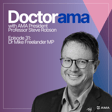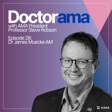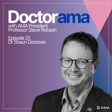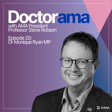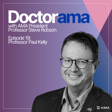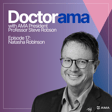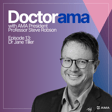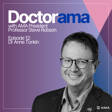Become a Creator today!Start creating today - Share your story with the world!
Start for free
00:00:00
00:00:01

Episode 27 - Samantha Payne
In episode 27 of Doctorama AMA President Professor Steve Robson chats with Samantha Payne, founder of Pink Elephants.
CONTENT WARNING: pregnancy loss.
Recommended
Transcript
Introduction and Content Warning
00:00:00
Speaker
Before we start this episode I want to add a content warning as my guest Samantha Payne and I discuss pregnancy loss and I realise this could be upsetting for many people. I thank Samantha for sharing so honestly her experiences and her work in this field and I do think there is much to gain from hearing her experience and how she supports others through Pink Elephants. If you think this might be a traumatic listen, then please ensure you have your support networks handy to debrief and get whatever help you need.
Lack of Support for Early Pregnancy Loss
00:00:32
Speaker
Well, speaking from my professional perspective as an obstetrician and gynecologist, I know and I've experienced over the years, the shattering effect that early pregnancy loss can have on women and on couples. But for the longest time, despite the distress this causes, there was very little support available. And many women felt that they had few options to go to for help. We're going to talk today to someone who took that challenge head on and dealt with it on Dr. ra
00:01:05
Speaker
You're listening to Dr Rama with Steve Robson, bringing you the best of health, medicine and people.
Samantha's Background and Move to Australia
00:01:14
Speaker
Well, my guest today on the Dr Rama podcast is the incredible Samantha Payne. Sam, welcome to Dr Rama. Thanks for having me, Steve. Excited to be here. It's a real pleasure. Sam, the first thing I want to do, everybody who's listening will recognise that you are British. Tell me a little bit about where you grew up and how you ended up being in Australia. I grew up in a little town in the north of England referred to as St. Helens. So if anyone that follows rugby, they may or may not have heard of it. um I left there at 18. I couldn't get out quick enough. I still have family there. I still love that part of the world. But for me, I wanted bigger and faster. And so I moved to London where I met my husband now. And together during in the m global recession, we decided that
00:01:59
Speaker
London was no longer for us and we had the option to move to Australia and it was honestly the best thing we have done and yet we now have three children that proudly call themselves Australia and support the Matildas and will not have a bar of England in any way.
Healthcare Systems: UK vs Australia
00:02:15
Speaker
Sam, I'm going to clear this up. Do you still support a football team back home? I do. I support Liverpool, who everyone's dismayed, but I do. um I guess my first question, the health system in the UK, the NHS and the health system there is somewhat different to Australia. Did you find any problems or difficulties navigating the system here? Because it will have implications for what we're going to talk about.
00:02:43
Speaker
me It's an interesting um context and question, Steve. I feel that I was a child in the healthcare system in the UK and honestly I left the UK at 25. So my view of it is from that perspective. um I personally also had um heart issues as a child and I had to go through major surgery. But I remember we had swift access that was never a problem. I had an amazing surgeon that looked after myself and my family and checked in with us regularly afterwards. So I guess I've had a really good experience of the UK Health System um and really grateful that I'm here today because of that surgery. Well look, that's that's really gratifying to know.
Samantha's Personal Loss and Pink Elephants
00:03:24
Speaker
Sam, I went back through emails and we first connected with each other
00:03:29
Speaker
ah in very early 2021 and you were on a mission at that time to help women with early pregnancy loss. I'd really like to hear how you came to develop pink elephants. and your own experiences and what you learned and and what drove you to do the incredible advocacy work that you do now. So I had um my own experience of early pregnancy loss. I had a beautiful daughter, Georgie. um She's now nearly 11. But when she was one, we decided we would try and conceive again and we'd want number two. Miss Coach was not something that was on our radar. You'd heard the word but didn't think it could happen to us, which is what a lot of people also tell me now.
00:04:11
Speaker
and Sadly, when we did fall pregnant, um I rather naively took Georgie to that scan with me. I didn't even take my husband and was told that there was no heartbeat. That was my first loss. I walked out of that. No one wanted to talk about miscarriage with me. I was really silenced. People would talk in hushed whispers. I've had one too. and I found that really strange and different to what I was feeling. But I listened to everyone. I was told it's common, it's one in four pregnancies. I was like, this is my one in four. We'll just go again. We'll be okay. um and Sadly, we also then backed straight into another pregnancy loss. um This was different. This was a natural loss.
00:04:49
Speaker
i had to and no I knew the baby's heart had stopped beating and I was already presenting this bleeding so I was given the option to naturally, and I want a better word for that one, naturally miscarry at home. um But no support. And at three in the morning, as a woman that had labour, I'd had contractions before. I was having contractions, albeit nowhere near as strong as full-term labour. But I was having contractions, and at three in the morning, I passed that baby alone in the shower, or what was the baby. You couldn't tell, obviously. and But there was a large volume of blood. It was terrifying to me. um I was really traumatised. I couldn't use that bathroom for years.
00:05:26
Speaker
And it was after that experience, I was like, if this is so common and that's referred to as natural and I'm not offered any support, no counseling to debrief on what's happened to me, no one followed up to check I was okay. I was just expected to fall pregnant again and have this other child. you just Everything's okay then is what people thought. And I got angry and I decided they enough is enough. I can't be the only one that needs support. And I started to connect with other women and I started to ask the questions of what would you have liked? What support would have worked for you? And little by little those threads all came together to begin pink elephants from the beginning.
00:06:02
Speaker
and I quite quickly realised this was a huge issue that had been massively under-addressed and everyone had looked away from it and I didn't want to look away from it. I wanted to tackle it head-on and I wanted to give everyone the support that I truly believe that they deserved when they're going through something so traumatic. Sam, these things are so important and these experiences are so common. I'd like to deal with them in some detail going forward. and First thing I want to talk about is breaking the news. So I unfortunately have to break this news commonly and I see lots of women and couples in your position coming along with expectation of a pregnancy and having to to break this this dreadful news. And of all the news I break, you know sometimes you break news of cancer and other serious conditions. I find this the most difficult. Now you've spoken to lots of women about the issue.
00:06:53
Speaker
What is it about breaking the news that is so traumatic for for women to hear? and And how can we do this better? And that's my very first question. We've got a lot to go from here. ah Great question. So what I've heard over the eight years that Pink Elephants has been in this space, and I've heard very loudly that women feel rushed through the health system. They feel medically managed to a certain point as in you're just a number and miscarriage is common. For example, women may present their EDs and it's really quick and they're told just to wait in the public waiting area because it's not an emergency.
00:07:29
Speaker
There is a lack of validation of the loss for the mother and the partner. um There is no acknowledgement of the loss as a baby. A lot of doctors do this really well now and I want to add that. I'm not blanketing all doctors together. We get amazing feedback from some doctors now and um women who've had access to those doctors. But we do generally still hear the lack of validation, the rushed approach to this. The lack of follow-up after the experience, but I would say the most traumatizing thing is the language that we have for this experience. We often still use terms like spontaneous abortion or abortion.
00:08:05
Speaker
um These words, they they stick with us and they're what we remember. and The problem with that is that what we ruminate on after the experience and the language matters. We need to be very careful with what we say. We know there's a need for medical language on medical forms, but that doesn't need mean that we need to hear that language presented to us. because What we hear and what we feel is it's our baby. We've lost our baby and yet we're being referred to as fetus or spontaneous abortion, all of those words. really don't validate what we're feeling.
00:08:39
Speaker
Sam, it is a traumatic thing to be told that you have lost your baby in a wanted pregnancy where there is so much expectation of an addition to the family.
Handling Stress in Subsequent Pregnancies
00:08:53
Speaker
But hearing this statistic and you brought it up and I hear it all the time. Oh, this happens all the time. Although, you know, and that is meant to be a, I guess, a platitude to make you feel better. But my experience is the grief is real. how do we How do we frame this? How how do you think? and And having spoken to women, we can say, look, the experience is commonly shared by women, but it does not make it any easier to bear. Yeah. We talk about three key things at Pink Elephants and it's validation, empathy and connection. And if you can remember validation, empathy and connection, what you can do is set that woman and her partner up for the support that they deserve after the experience.
00:09:38
Speaker
know that obviously in the interim, the beginning part, sorry, when they're hearing that news for the very first time to them, yes, it's common. We can understand that, but to us, it is a loss of our baby. So it's not to say, don't say it's common to us. That's okay. We understand that you can then find, but when you say that, you say it so that they can find support from other people through organizations like Pink Elephants, Red Nose, Birds of Hope. You can share that via that connection piece and then the empathy piece is watching them and responding to them how they are. Some will be completely numb, some will be okay and want to process this and move on quicker than others, others will feel this deeply.
00:10:15
Speaker
And I guess you've got two minutes within a medical set into a point, so we don't expect miracles or anything, but we do expect some empathy. I'm sorry for your loss. Those simple statements, if you say that, they mean so much to us because what you're doing is you're wearing a medical coat and you're telling us it's okay to grieve. When you don't do that, our grief is then disenfranchised. And I myself, after my second mis-coach, I thought, literally, I'm having a mental health breakdown. I didn't feel that it was bereavement because I was told you're not allowed to grieve a pregnancy so early on. It doesn't matter. It's not a real baby yet. So I was having all of these terrifying emotions for the first time ever in my life as an adult, and I didn't know how to get the help that I deserved or were to get the help. And then when I did actually ask, there wasn't any help then for early pregnancy loss.
00:11:01
Speaker
So you have such a strong position to offer that validation and tell women and partners it's okay to grieve this loss. Here's where you go to for support. Sam, the next thing that comes up, most people will try for another pregnancy. And I'm guessing this is a time of high stress from finding out that you are pregnant to having those early pregnancy tests. What are women telling you about how they're supporting that time of high anxiety when they had the bad experience first time and they're anticipating something next time?
Coping Post-Loss and Misconceptions
00:11:35
Speaker
What what to what advice do you give women to cope in that period?
00:11:40
Speaker
Again, that comes back to connection. Don't isolate yourself, seek support. That support might be joining an online community like Pink Elephants and talking with other women that are in the same position as you who are also working that right now. It is incredibly brave to make the decision to try and conceive again. Rolling the dice, you're saying, I'm willing to go again because ultimately I want a baby in my arms, so but I'm terrified that I'm going to have another loss and I'm not sure I'm strong enough to go to another loss. What a lot of women do is ruminate as well, that thought process around, It's almost like disassociating yourself. I believe I'm going to lose this baby again, so therefore I'm not going to think about it. I'm not pregnant. It's ending anyway, so why am I going to go there? So they don't allow themselves that kind of future hope of that pregnancy. Before they even get pregnant, we know then that a lot of women also struggle to conceive. So that first pregnancy that they've lost may have been
00:12:31
Speaker
a pregnancy after many many years of infertility challenges which can add gravitas as well and the thought of having to go through all that again and possibly having another loss. I feel like society has this expectation that miscarriage happens early therefore you've got a week or two to grieve it and you're completely fine. No one thinks about what you've just rightly brought up which is this preconception after loss trying again and then pregnancy after loss which are mean incredibly anxiety inducing and we need so much support at that point so much. Sam, I'm going to come to you setting up Pink Hope in a second, but the last thing you brought it up, and you just spoke so strongly about it, was the experience of the loss at home. and We know that most of the time people either will use medications like misoprostol or something to allow
00:13:20
Speaker
um things to happen at home. But it's not necessarily, you know, we use the word natural, as you said, but it can be a very traumatic process. do you Do you think we could do better? How, if you, you know, in an ideal world, how do you think we could do this better? I feel like women should be given guidance and support throughout the experience. And I feel like my experience could have been made so much better if I had been given counseling as to what to expect. If someone would have talked me through and said, this is probably what's going to happen with a baby of this size. This is how you're going to, because at that point I was 10 weeks. um This is how this will go potentially. And we know again, it's not that black and white, but some advice ahead of that experience, then it wouldn't have been as shocking and as traumatic.
00:14:07
Speaker
um The blood loss. I have never seen so much blood. I'm not a medical professional. i have i don't have I didn't know what was normal and what was not. My husband was terrified. It was like, do we go to hospital? Do we not go to hospital? What is normal? And we ended up presenting at the e-pass an hour earlier at like 6am. But yeah, we just need more guidance. We need to understand what can happen to us. And then we need follow-up. So yes, I had the e-pass near me. I'm fortunate I live in a metropolitan area area and I could get to my hospital in 10 minutes. so ah yeah And also I'd already had a baby, so I was had an understanding that these were contractions, they were coming in waves. If you've not yet had a full-term pregnancy and had that experience to feel that level of pain, it was not a heavy period. I have heavy periods. That was not a heavy period. That was my body doing what it needed to do.
00:14:54
Speaker
and i'm grateful that my body did that but then i wasn't prepared and then the last thing is and there's a beautiful lady now that set up an organization doing it's called soul collections i had to flush what i thought were the remains of my baby down the toilet this is okay this is uh Really heartbreaking, Sam, and very, very
Founding and Challenges of Pink Elephants
00:15:18
Speaker
common. Now, I've had the incredible privilege of meeting and speaking with people who have turned grief and distress into something really positive, ah like ah Rachel and Johnny Casilla from the um Mackenzie's Mission Project to Crystal Barta, who set up Pink Hope. But those conditions they were dealing with are relatively uncommon.
00:15:43
Speaker
Sam, what you're dealing with is an experience that's just so common. You must have found the demand overwhelming. So I'd love to to hear how you went about setting up Pink Elephants and what the experience of setting up this organization was like for you. It was due alleged in that I knew the problem was huge and a huge volume of people. but I couldn't look away. I was so driven and originally it was for the babies that I was losing at the time. I was still very much going through this when I started this. So the definite was an element of that post-traumatic growth. i'm Now it's different. Now it's about the system being changed long-term. It's legacy piece now for me. In those early days, I honestly don't think that I understood the scale and I think that my naivety really helped because I don't think certain people have tackled this before because it's too big of a problem.
00:16:35
Speaker
yeah and Honestly, in my head, I was like, no, we can do this. We're doing this. This is what we're going to do. But then broke it down into small manageable. We're going to start here. and Also then really making it known about me and my experience. so From the very beginning, I held focus groups and I listened to other women's experiences of loss. And I knew that my experience was my experience, but the lady next to me wasn't the same at all. Perhaps she'd had a termination for medical reasons. Perhaps the other woman had had an ectopic pregnancy. and Each of those pregnancy losses have their own enuences that need to be understood. And I guess that's been Pink Elephant's success, if you like. Not only the demand, but matching the demand with the real need, really listening deeply and creating support services that women actually want.
00:17:18
Speaker
The hard part is growing an organization that can be sustainable in a system that's stacked against us. It's a really hard place to operate in non-profit, even the language that's used around that, right? It's not easy. i'm But it's it just because it's not easy doesn't mean you don't do it, right? And things that are hard need to be tackled. Yeah, I agree. I think we need to change the language from non-profit to for-purpose yeah organisations, because I think that better sums things up. Sam, the incredible amount of effort that you have put into this must have affected your own life and your family. what What has the experience been like? How has it played out for you personally? how Has it made you feel better, more more stressed, more work?
00:18:04
Speaker
and And have your your family responded and and worked with you on this? I firstly have the most amazing partner, my husband, who watched and witnessed his loved wife go through the most traumatic thing ever. And he could not help me. Nothing could fix this. And so for him as well, Pink Elephant has been helpful. um And seeing that in those early days setting this up did really help me to foster those connections with other people. I was accessing support at the same time in a wit in a way.
00:18:35
Speaker
But this has been the hardest thing I have ever done, and I don't think anyone understands the stress of starting a for purpose organization and yeah the sacrifices that we make. um I now get to parent three amazing children. I'm incredibly grateful, but I really struggle with these boundaries of How do I be a present parent when I'm working on something so massive and this organization is growing at a rapid rate and amazing board and other people that help now? It's it's fabulous that we've got a team of us doing this work every day, but it's hard. It's hard work. It's grief. It's a small organization where the demand far exceeds the actual ability and sustainability. We need to grow our funding. It's not easy. It's been absolute. There's been many times I've gone, I'm done. I need to walk away. This isn't this is going to break
Partner's Role in Pregnancy Loss
00:19:19
Speaker
me.
00:19:19
Speaker
But then you have that one conversation with that one woman that you were there for, that nobody else was. And you go, I can't. We have to keep doing this. This matters and it works. Yeah, absolutely. And you brought up something really important, which is about the partner, that the prospective father in the couple. And often it's an unspoken part of of when we deal with this. um Sometimes, as you say, because the the father of the baby isn't actually present and they've got other things on or whatever. What have you learned about the reactions in fathers and partners ah around ah early pregnancy loss for couples? We have some incredible partners who are part of Pink Elephants. What we've observed over the years and heard very loudly is that partners grieve too, but they are often put in the place of support person.
00:20:12
Speaker
They're often thrust into, this is happening to my wife because it's medically happening through her body, right? So they feel a need to be there and support her. But often no one asks them, how are you going? You also had hopes, dreams and futures planned for this baby. You had gestation in mind too. And often there is no space for that in those early days. um So it can be really hard. So we really try and advocate that partners are offered support too. But also what we see that's really beautiful is that partners do a lot of incredible, amazing fundraisers for us. We have one amazing man here.
00:20:43
Speaker
ran nine marathons. We've had another man do three rowing marathons. They show their grief in a really kind of physical manifestation. yeah yeah And it's beautiful because then it gives back and supports us. But partners grieve too. Partners need support. And often what we find in couples and this is not gendered, but it's often portrayed in a gendered way, is that partners grieve differently. So for me, I needed to do something, I had to fix the problem and that was my grief, whereas my husband didn't grieve that way at all. He was quiet and he withdrew and he didn't want to talk about the experience. That can cause conflict in a relationship and often they actually just need support to understand that it's okay and we all grieve differently. Yeah, wow. The amount of work that you put into this, the extraordinary energy and enthusiasm that you put into this is truly remarkable. It is a testament to you. What does the future hold for you, Sam? where Where do you see things going as we move forward from here?
Future of Pink Elephants and Systemic Changes
00:21:42
Speaker
I'm really excited about where we are. We're seeing government acknowledgement that early pregnancy loss deserves its own space and support. We're seeing government assistant minister Jed Carney is
00:21:54
Speaker
Investing in research and data, we're going to start to actually look at this problem properly and understand the actual numbers of women. and We're going to look at the experience in healthcare care settings and them that have support for women as well. so I'm excited that we're on the precipice of real systemic change, not just one part. Let's actually look at the whole picture. um But I'm by no means as naive as I was eight years ago. This is a problem that will take many, many years. I wish I was in some ways. It was much easier then. I was like, yes, I can fix this in a year. and and none I know that now. um
00:22:28
Speaker
But I'm excited because for my daughters and my son who will grow up and likely may have this experience, they will not have the experience that I had. They will be met with all of the empathy, support and understanding that they deserve. And that will largely be because of this organization listening and advocating for the needs of our community. same I was going to wrap up by saying it is such a common and shattering experience for so many women and so many couples. have you ever Did you ever stop to reflect, to say you know for something so common that has so many impacts on so many people, how do we end up in ah in the position in the first place where it was so poorly acknowledged and so few
00:23:14
Speaker
um support networks available. How do we end up there? Is it because it is something that people don't want to talk about or do you have any thoughts on
Cultural Barriers in Acknowledging Loss
00:23:22
Speaker
that? I feel like it's this messy combination of it's a women's health issue. So you have obviously elements of medical misogyny that have played out there, the lack of research into women's health issues. Then you have the death of the baby, which makes people so uncomfortable. They can't talk about it. And if you think about where stillbirth was 30 years ago and where that is now, there's still work to be done there. But at least women now are offered a five different experience and better experience.
00:23:46
Speaker
and I feel like it was this combination of all of those things that made it too hard. So anyone who wasn't as naive as I was eight years ago couldn't look at it because it was too hard. um It needed to be a bereaved parent as well. It honestly needed to be a mother like me that this is for the babies that I will never get to parent, that I will always love deeply, that I wanted so very much. And I know how much this hurts. So I needed to start this organization. It needed to be someone like that. I feel like they could genuinely tackle it. Sam, when we first spoke and it was getting on for four years ago, I was incredibly impressed with everything that you wanted to achieve and looking at how things have gone for you.
00:24:28
Speaker
Several years later, you've absolutely nailed this, but you've got a lot more to do. I want to congratulate you and all of your team, everybody involved with pink elephants, all of the people who you've you've spoken to, and I'm sure so many people who want to thank you for the help. Have you got a final, I guess, message for women who have just faced this? What would you say as a friend to somebody who's just had an early pregnancy loss?
Message of Support for Women
00:24:57
Speaker
You're not alone. It was nothing you did. It's not your fault. It's okay to grieve the loss of your baby. And please, please reach out for support. Pink Elephants is here for you. So Sam, the Pink Elephants web address just run me through that again. We'll put a link near the podcast here as well. It's pinkelephants.org.au and our social handle is at pinkelephantssupport.
00:25:21
Speaker
Fantastic. Thank you so much. I know you're incredibly busy. I know you have a lot of family demands because of all the time you spend on Pink elephants. I'm so grateful that you've spoken to me and taken that time today on Dr Rama. Thank you so much, Steve.
00:25:45
Speaker
You've been listening to Dr Rama, a podcast produced on Ngunnawal country by the Australian Medical Association. All rights reserved.
